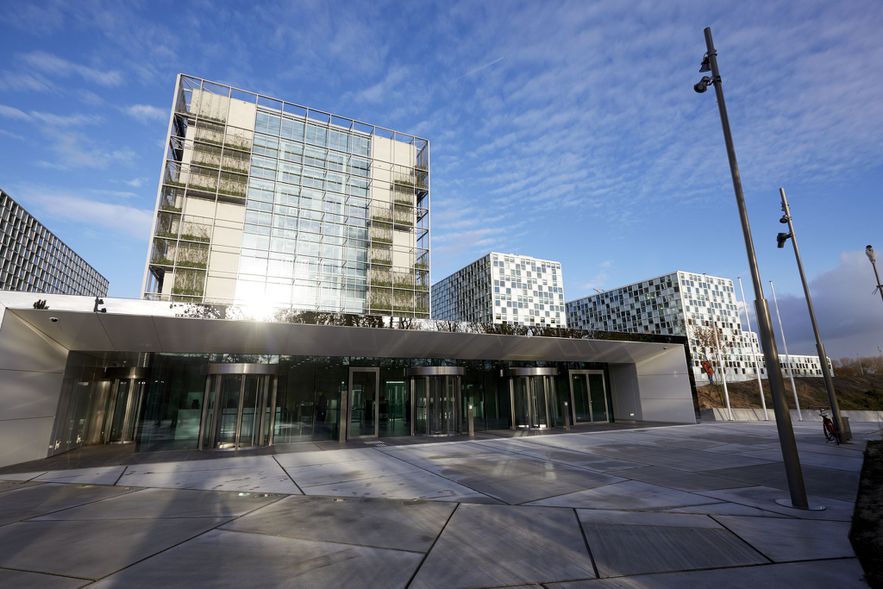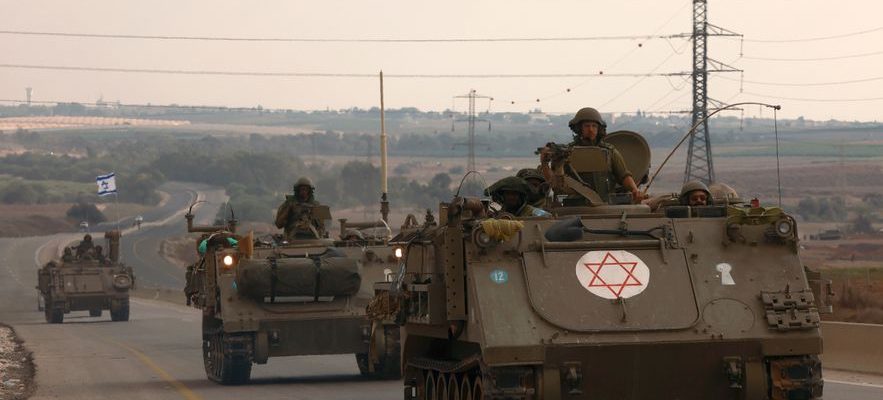Already flouted in Ukraine, attacked by Russia, and in the Caucasus, where the Armenian populations of Nagorno-Karabakh fled after the military victory of the Azerbaijani army, the law of war, defined by the Geneva conventions, is found also at the heart of debates in the Middle East. And this, while a large-scale ground operation by Israel in Gaza is expected to follow massive bombings that have caused thousands of victims, after the abuses of the terrorist group Hamas, which kidnapped nearly 200 people. Tuesday evening, October 17, a strike against a hospital in Gaza, for which Israel and the Palestinians blame each other, left hundreds dead and provoked angry demonstrations in the Muslim world.
“In a conflict, we can all have an opinion, but from a strictly legal point of view, we must always start from the victims and the crimes committed against them”, wishes to clarify, in preamble to the interview that she granted to L’Express Mathilde Philip-Gay, professor of law at Jean-Moulin Lyon 3 University. Author of Can we judge Putin? (Albin Michel, May 2023), this specialist in international humanitarian law recalls that, on a legal level, Israel “must above all not intentionally target civilians” and that it may be required to “prove that it has done everything in that Sens”. Interview.
L’Express: How does the current blockade of Gaza (water, electricity, gas, etc.) by Israel pose problems in terms of international law?
Mathilde Philip-Gay: In the law of war, a blockade is an act of war which aims to block by force all communication, all exchange with the outside of a territory. This is not prohibited in itself, but it should not constitute collective punishment. It must be justified by military necessity. Above all, States are obliged to grant free passage of a humanitarian nature for the survival of the civilian population, their assistance and their food. Thus, organizing a famine of civilians by completely cutting off their supplies is contrary to international humanitarian law.
What are the main rules of humanitarian law that Israel must respect in the event of an invasion of the Gaza Strip?
As a matter of law, Israel (like Hamas) must not intentionally target civilians. It must also not destroy the infrastructure necessary for their survival. Israel must collect and care for the wounded and sick, and respect the lives of soldiers who have laid down their arms. And when civilians are in conflict zones, he must protect them, respect their lives, their dignity. The Jewish State must make a fundamental distinction between the civilian populations, to spare them, and the combatants.
We see that the Israeli government is perfectly aware of the need to respect international law, because the warning to civilian populations aims to lead them to distinguish themselves from combatants. We understand that the problem is that in Gaza the fighting takes place in civilian areas where part of the population remains despite everything – because they decide to or because they have no choice – and that she will unfortunately pay a high price, as in all wars. This shows the limits of the law.
Israeli armored vehicles head towards the border with Gaza, October 16, 2023
© / afp.com/Menahem KAHANA
What is the difference between war law and humanitarian law?
Although it may be morally disturbing, there are indeed rules that apply to armed conflict. International humanitarian law brings together all those whose objective is to “humanize” war, to limit its effects on civilians, but also on sick or injured combatants and prisoners of war.
These rights are based on the various Geneva Conventions and their additional protocols, and all the conventions which have prohibited the use of certain weapons, such as mines, cluster munitions and chemical weapons. Failure to apply these rules entails the responsibility of a State, which may find itself paying for reparations. Individuals can also be prosecuted for not having respected these rules and could end their days in prison.
In the event of suspicion of war crimes, what legal consequences in Israel?
Israeli courts have jurisdiction over war crimes committed by their nationals or on their territory. Without prejudging what could be done, if there is a lack of will or powerlessness to judge, the International Criminal Court (ICC) can intervene. Israel does not recognize it, but the Palestinians joined it in 2005. The ICC agreed to exercise its jurisdiction over the territories of Gaza and the West Bank, including East Jerusalem. She clarified that this was without prejudging the statehood of Palestine and without commenting on the drawing of borders. I add that if there are foreign victims in Gaza, the courts of their states of nationality have jurisdiction. For example, if a French person dies in a bombing, his family can file a complaint in France.
What does the law say when civilians find themselves in the middle of fighting or are used as human shields, which we fear in particular for Hamas hostages?
According to the Geneva Conventions, and according to the statute of the ICC, it is prohibited to use a civilian or a prisoner of war to protect a military point or zone. Doing this constitutes a war crime, which has already been punished at the Nuremberg tribunal after the Second World War, then, more recently, by the International Criminal Tribunal for the former Yugoslavia. Human shields are already considered hostages. Faced with human shields, faced with this war crime, therefore, as far as possible, the other belligerent must distinguish between civilians and combatants, but again it is extremely complex. Above all, it must not intentionally target civilians.

The International Criminal Court has jurisdiction to try war crimes, crimes against humanity and genocide in the case of Ukraine.
© / afp.com/Martijn Beekman
What types of crimes constitute Hamas’ abuses?
The same crime (assassination, act of torture, kidnapping, rape) can be considered terrorism, a war crime, a crime against humanity, etc. From a strictly legal point of view, there is no clear international definition of terrorism that achieves consensus, due to the political and ideological connotations of this term. The European Union in any case considers Hamas to be a terrorist group.
Hamas’ abuses constitute war crimes because they are committed in the context of an armed conflict. Such acts can also be considered crimes against humanity, if it can be proven that they were committed within the framework of an organized, systematic and general policy. That is to say, if there are orders, proof of these orders and their purpose. In the current state of our knowledge, it is possible that this qualification could be retained.
And the crime of genocide?
This crime aims to wipe out an ethnic, racial, religious or national group from the face of the earth. But genocidal intent must be proven, which makes it a much more complex crime to qualify than other international crimes.
In recent months, we have seen war crimes and crimes against humanity in Ukraine, Karabakh, Ethiopia… Are they on the rise?
I don’t know if they are on the rise. One thing is certain for the lawyer that I am: there is less tolerance for these crimes, which we know how to qualify, with the possibility of trying them. Since the 1990s, courts have judged crimes committed in the former Yugoslavia, Rwanda, Cambodia and Lebanon. We know it’s possible. There is a demand from the victims to have the culprits judged and punished. But it is not yet perfect, these crimes will not all be judged. We must work for zero tolerance which deters them from committing them.
What reforms are possible to improve humanitarian law?
Part of international criminal law became autonomous at the end of the Second World War. Since then, it has been considered that individuals, and no longer just States, can be held responsible for their actions under international law. There was further progress with the launch of the International Criminal Court in the 2000s, which has its permanent headquarters in The Hague, Netherlands. But there are reforms to consider for it to take off. Its jurisdiction must be broadened: after the recognition of the crime of aggression, which consists of waging an illegal war, calls are increasing to take charge of other crimes, such as that of ecocide [NDLR : la destruction irrémédiable d’un écosystème].
But for the ICC to be effective, it needs more funds, knowing that the protection of witnesses and the collection of evidence require resources. Finally, each State must take its part because one of the main principles of international humanitarian law is that all States are responsible for respecting it, including those which are not involved in the war. National laws must be exemplary to allow the perpetrators of ecocide, war crimes or crimes against humanity to be prosecuted and punished. More countries need to join the ICC and lead by example.
In recent days, Armenia has just joined, which could perhaps allow investigations into crimes against the Armenian populations of Nagorno-Karabakh to continue. But Russia, China and the United States have not yet joined the ICC. Finally, there are ways for states to resolve their disputes peacefully. They work – every day disputes between countries are settled before judges – but they must be developed. We must not only humanize war, but above all seek to prevent certain wars through law.
